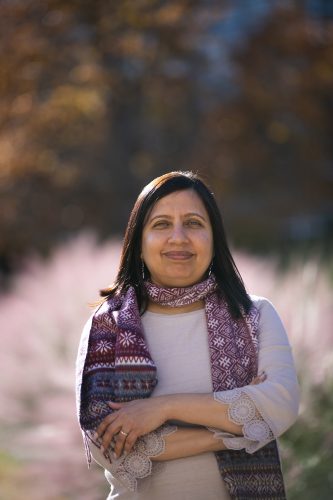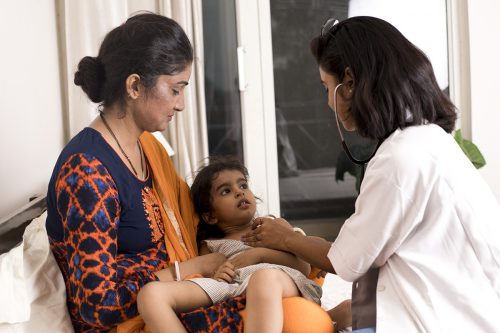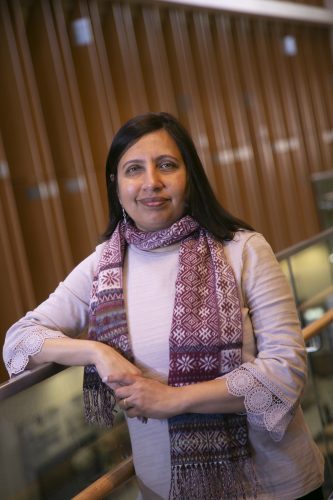Community Support Helps Families Rise to a Challenge
Assistant professor Aesha John researches the understanding, impact and resources of parents with an intellectually disabled child.
Community Support Helps Families Rise to a Challenge
Assistant professor Aesha John researches the understanding, impact and resources of parents with an intellectually disabled child.
Aesha John moved to the U.S. from her hometown of Gujarat, India, to continue graduate studies in the early 2000s, but she kept her sights on her home country.

Aesha John, assistant professor of social work, says, “An individual can only be so resilient if there are no resources or political support.” Photo by Rodger Mallison
When the social work scholar studied agencies that provide services to parents of children with an intellectual disability, John noticed how models designed to assess family bonds revolved around Western notions of independence, affluence and available resources.
“We often forget the voices of people across the world,” said John, assistant professor of social work and director of the bachelor of social work program in the Harris College of Nursing & Health Sciences.
Social work’s stress and resilience framework in particular integrated Western assumptions into the assessment of how people handled raising a child with an intellectual disability. The framework homes in on three components of challenging parenting situations: how people make sense of their child’s disability, the impacts on the family and how much assistance formal resources provide.
But previous researchers assumed a science-based interpretative lens, a nuclear family unit, and the availability of health and educational resources.
To untangle the framework from its Western roots, John returned to India to speak with approximately 50 mothers of 3- to 6-year-olds with an intellectual disability ranging from autism to cerebral palsy and ask about how they handled and adapted to the child’s disability diagnosis. Until recently in India, she said, “mental retardation” was often the term used to refer to all intellectual disabilities.
The mothers’ responses led to an article in the October 2017 edition of the journal Intellectual and Developmental Disabilities. John co-wrote the study with Martha Zapata Roblyer, a research scientist at Oklahoma State University-Tulsa.
“One of the things we critique in the article is this Western framework of the individual, saying, ‘This individual is resilient,’ ” John said. But “an individual can only be so resilient if there are no resources or political support. There is a ton of social stigma [in India], so don’t put the burden on the individual.”

Aesha John’s research revealed that doctors in India can be a source of support for families raising a child with an intellectual disability. Photo by Getty Images – TRILOKS
John’s insights earned the praise of Tracy Rundstrom Williams ’96, associate director of the Center for International Studies: TCU Abroad. “This research is valuable for social, cultural and international reasons, and it contributes to TCU’s goals of positively impacting the global community.
“This research provides such an important lens on the impact of society and culture on education, parenting and accessing resources,” Williams said. “By identifying underlying dynamics, attitudes and infrastructures, John opens up the conversation for more effective and culturally appropriate approaches.”
In Western culture, intellectual disabilities are understood to be biological. In India, the notion of karma confused the sense-making process, at times causing the mother to assume her behavior — in this life or a previous one — caused the child’s disability. Some Indian mothers had never even heard of autism until learning of their child’s diagnosis.
In the West, parents can rely on educational systems to accommodate children with disabilities. In India, formal education for these children can be much harder to find, John said.
While extended families in the U.S. may see one another occasionally or only during major holidays, extended families often live under the same roof in India. But many Indian mothers in the study reported that the support provided by a large family tended to evaporate when a child with an intellectual disability joined the clan, forcing the mother to assume responsibility on her own. Some people in the study bucked the joint-family model by moving out of their homes to survive as a nuclear family.

Aesha John says community support like specialized schools can help Indian parents face the challenge of raising a child with an intellectual disability. Photo by Rodger Mallison
In one surprising finding, three of the 50 participants were separated from their husbands — a remarkably high number given that approximately 1 in 1,000 marriages in India ends in divorce. But many other respondents reported that their husbands participated in the caregiving, lessening the mothers’ stress and assisting with the children’s development.
One of John’s major research-based insights was that Indian fathers can play an important role in filling the support gaps and being a source of strength for struggling mothers.
Support of all types correlates with better parental resilience, and John said India would benefit from more specialized schools designed to serve children with intellectual disabilities. Physicians could also provide education about why disabilities happen, which would help the families make sense of their predicament.
John’s goal is to advocate for more resources for families raising a child with a disability. “I want to continue my education efforts,” she said. “Knowledge is everything.”

Your comments are welcome
Comments
Related reading:
Campus News: Alma Matters
Beyond the Spectrum
Naomi Ekas is using positive psychology to ease the stress experienced by parents of children with autism.
Alumni, Features
Making a Difference Through Medical Nonprofits
Four alumni physicians have a heart for healing and work to make the world a better place — one patient at a time.
Alumni, Features
Dr. J Mack Slaughter Focuses on Healing the Spirit
The emergency room physician started Music Meets Medicine to give children with long-term illnesses a creative escape.